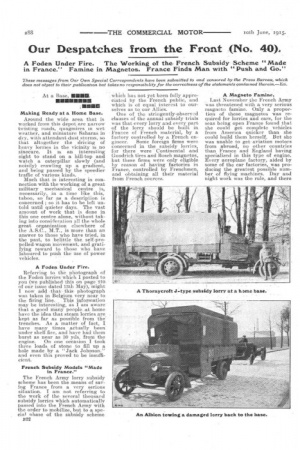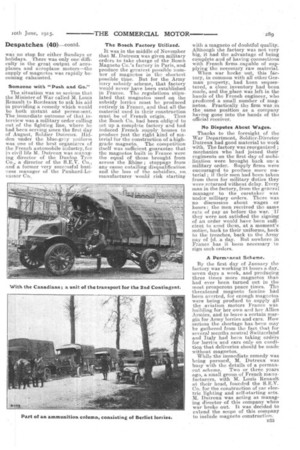Our Despatches from the Front (No. 40)
Page 4

Page 5

If you've noticed an error in this article please click here to report it so we can fix it.
A Foden Under Fire. The Working of the French Subsidy Scheme "Made in France." Famine in Magnetos. France Finds Man with "Push and Go."
These messages from Oar Own Special Correspondents have been submitted to and censored by the Press Bureau, which does not object to their publication but takes no responsibtlity for the correctness of the statements contatned therein.—ED.
. At a Base, NEMO.
Making Ready at a Home Base.
Around the wide area that is worked from this depot are narrow twisting roads, quagmires in wet weather, and miniature Saharas in dry, with attendant dust storms, so that altogether the driving of heavy lorries in the vicinity is no sinecure. It is an interesting sight to stand on a hill-top and watch a caterpillar slowly (and noisily) crawling up a gradient, and being passed by the speedier traffic of various kinds.
Much that is interesting in connection with the working of .a great militarymechanical centre is, necessarily, in a time like this, taboo, so far as a description is concerned ; so it has to be left untold until quieter days. The vast amount of work that is done in this one centre alone, without taking into consideration all the whole great organization elsewhere of the A.S.C., M.T., is more than an answer to those who have tried, in the past, to .belittle the, self-propelled-wagon metnent, and grati-fying reward to those who have laboured to ptish the Use Of power vehicles.
A Foden Under Fire.
Referring to the photograph of the Foden lorries which I posted to you (we publisheci.this on page" 210 of our issue dated 13th May), might I now add .-that-thisphotograph was taken in Belgium very near to the firing. line. This information may be interesting, a.s I am aware that a good Many people. at home have the idea that steam lorries are kept as far as possible from the trenches. As a matter of fact, I have many times aCtually be-en under shell fire, and have had them burst as near as 30 yds. front': the engine. On one occasion I took three loads of stone to fill up a hole made by a "Jack Johnson." and even this proved to be insufficient.
French Subsidy Models "Made in France."
The French Army lorry subsidy scheme has been the .means of saving France from a very serious situation. I am not referring to the work of the several thousard subsidy lorries which automatically passed into the French Army with the order to mobilize, but to a special -abase of the subsidy scheme
B22 . which has not yet been fully appreciated by the French public, and which is of equal interest to ourselves as to our Allies.
One of the stringently-observed clauses of the annual subsidy trials was that every lorry and every part of the lorry should be built in France of french material, by a factory controlled by a French en gineer. Sorne foreign firms were concerned in the subsidy lorries, for there were Continental and Goodrich tires and Bosch magnetos, but these firms were only eligible by reason of having factories in France, controlled by Frenchmen, and obtaining all their material from French sources.
A Magneto Famine,
Last November the French Army was threatened with a very serious magneto famine. Only a proportion of these magnetos was required for lorries and cars, for the seas being open France found that she could get complete vehicles from America quicker than she could build them herself. But she was unable to get-aviation motors from abroad, no other countries than France and England having specialized in this type of engine. Every aeroplane factory, aided by some of the car factories, was producing the greatest possible number of flying machines. Day and night work was the rule, and there was no stop for either Sundays or holidays. There was only one difficulty in the great output of aeroplanes and aeroplane motors—the supply of magnetos was rapidly becoming exhausted.
Someone with "Push and Go."
The situation was so serious that the Minister of War called M. Louis Renault to Bordeaux to ask his aid in providing a remedy which would be both instant and permanent. The immediate outcome of that interview was a military order calling out of the fighting line, where he had been serving since the first day of August, Soldier Dutreux. Hidden under the blue-grey uniform was one of the best organizers of the French automobile industry, for in civil life M. Dutreux was managing director of the Dunlop Tyre Co.' .a director of the S.E.V. Co., and a former very successful business manager of the Panhard-Levassor Co..
The Bosch Factory Utilized.
It was in the middle of November that M. Dutreux was given military orders to take charge of the Bosch Magneto Co.'s factory in Paris, and produce the greatest possible ritilllbar of magnetos in the shortest possible time. But for the Army lorry subsidy scheme, that factory would never have been established in France. The regulations stipulated that magnetos used on the subsidy lorries must be produced entirely in France, and that all the material used in their construction must be of French origin. Thus the Bosch Co. had been obliged to set up a complete factory and had induced French supplyhouses to produce just the right kind of material for the construction of a highgrade magneto. The competition itself was sufficient -guarantee that the magnetos built in France were the equal of those brought from across the Rhine ; stoppage from any cause entailing disqualification and the loss of the subsidies, no.• manufacturer would risk starting
with a magneto of doubtful quality. Although the factory was not very big, it had the advantage of being complete and of having connect-one with French firms -capable of supplying the necessary raw material.
When war broke -out, this factory, in common with all other German property, had been sequestered, a close, inventory had been made, and the „place was left in the hands of the French engineer, who produced a small number cT magnetos. Practically the firm was .in the same position as a company having gone into the hands of the official receiver.
No Disputes About Wages.
Thanks to the foresight of the War Department, Soldier-Director Dutreux had good material to work with. The factory was reorganized ; mechanics who had joined their regiments on the first day of mobilization were brought back oni. military order. Supply firms were encouraged to produce more material; if their men had been taken from them for military duties they were returned without delay. Every man in the factory, from the general manager to the caretaker was under military orders. There was no discussion about wages or hours : the men received the same rate of pay as before the war. If they were not satisfied the signing of an order would have been sufficient to send them, at a moment's notice, back to their uniforms, back to the trenches, back to the Army pay of :id_ a day. But nowhere in France has it been necessary to sign such orders.
A Permlnent Scheme.
By the first day -of January the factory was working 24 hours a day, seven days a week, and producingthree times more magnetos than had ever been turned out in the most prosperous peace timesThe threatened magneto famine had been averted, for enough magnetos were being produed to supply *11 the aviation motors France was building for her own and her Allies Armies, and to leave a certain margin for Army lorries and cars. How serious the shortage hasbeen may be gathered from the fact that for severaJ months neutral Switzerland and Italy had been taking orders for lorries and cars only on condition that deliveries should be made without magnetos.
Whileethe immediate remedy was being pursued, M. Dutreux was busy with the details of a permanent scheme. Two or three years ago, a small group of French manufacturers, with M. Louis Renault at their head, founded the S.E.Y. Co. for the construction of ear electric lighting and self-starting sets. M. Dutreux was acting as managing director of this company when war broke out. It was decided to exiend. the scope of this company to include magneto construction:
























